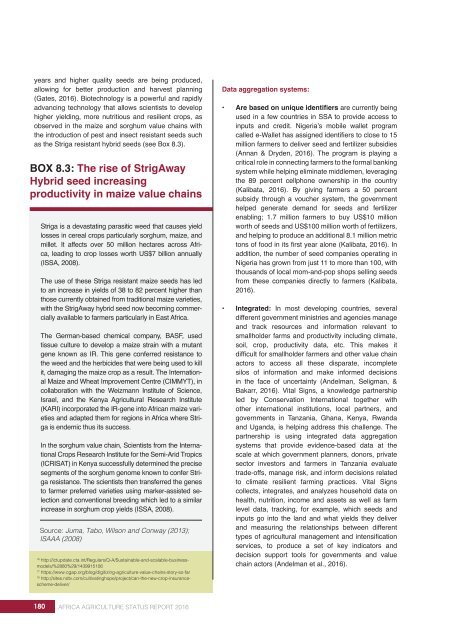AFRICA AGRICULTURE STATUS REPORT 2016
AASR-report_2016-1
AASR-report_2016-1
You also want an ePaper? Increase the reach of your titles
YUMPU automatically turns print PDFs into web optimized ePapers that Google loves.
years and higher quality seeds are being produced,<br />
allowing for better production and harvest planning<br />
(Gates, <strong>2016</strong>). Biotechnology is a powerful and rapidly<br />
advancing technology that allows scientists to develop<br />
higher yielding, more nutritious and resilient crops, as<br />
observed in the maize and sorghum value chains with<br />
the introduction of pest and insect resistant seeds such<br />
as the Striga resistant hybrid seeds (see Box 8.3).<br />
BOX 8.3: The rise of StrigAway<br />
Hybrid seed increasing<br />
productivity in maize value chains<br />
Striga is a devastating parasitic weed that causes yield<br />
losses in cereal crops particularly sorghum, maize, and<br />
millet. It affects over 50 million hectares across Africa,<br />
leading to crop losses worth US$7 billion annually<br />
(ISSA, 2008).<br />
The use of these Striga resistant maize seeds has led<br />
to an increase in yields of 38 to 82 percent higher than<br />
those currently obtained from traditional maize varieties,<br />
with the StrigAway hybrid seed now becoming commercially<br />
available to farmers particularly in East Africa.<br />
The German-based chemical company, BASF, used<br />
tissue culture to develop a maize strain with a mutant<br />
gene known as IR. This gene conferred resistance to<br />
the weed and the herbicides that were being used to kill<br />
it, damaging the maize crop as a result. The International<br />
Maize and Wheat Improvement Centre (CIMMYT), in<br />
collaboration with the Weizmann Institute of Science,<br />
Israel, and the Kenya Agricultural Research Institute<br />
(KARI) incorporated the IR-gene into African maize varieties<br />
and adapted them for regions in Africa where Striga<br />
is endemic thus its success.<br />
In the sorghum value chain, Scientists from the International<br />
Crops Research Institute for the Semi-Arid Tropics<br />
(ICRISAT) in Kenya successfully determined the precise<br />
segments of the sorghum genome known to confer Striga<br />
resistance. The scientists then transferred the genes<br />
to farmer preferred varieties using marker-assisted selection<br />
and conventional breeding which led to a similar<br />
increase in sorghum crop yields (ISSA, 2008).<br />
Source: Juma, Tabo, Wilson and Conway (2013);<br />
ISAAA (2008)<br />
16<br />
http://ictupdate.cta.int/Regulars/Q-A/Sustainable-and-scalable-businessmodels/%2880%29/1439915106<br />
17<br />
https://www.cgap.org/blog/digitizing-agriculture-value-chains-story-so-far<br />
18<br />
http://sites.ndtv.com/cultivatinghope/project/can-the-new-crop-insurancescheme-deliver/<br />
Data aggregation systems:<br />
• Are based on unique identifiers are currently being<br />
used in a few countries in SSA to provide access to<br />
inputs and credit. Nigeria’s mobile wallet program<br />
called e-Wallet has assigned identifiers to close to 15<br />
million farmers to deliver seed and fertilizer subsidies<br />
(Annan & Dryden, <strong>2016</strong>). The program is playing a<br />
critical role in connecting farmers to the formal banking<br />
system while helping eliminate middlemen, leveraging<br />
the 89 percent cellphone ownership in the country<br />
(Kalibata, <strong>2016</strong>). By giving farmers a 50 percent<br />
subsidy through a voucher system, the government<br />
helped generate demand for seeds and fertilizer<br />
enabling; 1.7 million farmers to buy US$10 million<br />
worth of seeds and US$100 million worth of fertilizers,<br />
and helping to produce an additional 8.1 million metric<br />
tons of food in its first year alone (Kalibata, <strong>2016</strong>). In<br />
addition, the number of seed companies operating in<br />
Nigeria has grown from just 11 to more than 100, with<br />
thousands of local mom-and-pop shops selling seeds<br />
from these companies directly to farmers (Kalibata,<br />
<strong>2016</strong>).<br />
• Integrated: In most developing countries, several<br />
different government ministries and agencies manage<br />
and track resources and information relevant to<br />
smallholder farms and productivity including climate,<br />
soil, crop, productivity data, etc. This makes it<br />
difficult for smallholder farmers and other value chain<br />
actors to access all these disparate, incomplete<br />
silos of information and make informed decisions<br />
in the face of uncertainty (Andelman, Seligman, &<br />
Bakarr, <strong>2016</strong>). Vital Signs, a knowledge partnership<br />
led by Conservation International together with<br />
other international institutions, local partners, and<br />
governments in Tanzania, Ghana, Kenya, Rwanda<br />
and Uganda, is helping address this challenge. The<br />
partnership is using integrated data aggregation<br />
systems that provide evidence-based data at the<br />
scale at which government planners, donors, private<br />
sector investors and farmers in Tanzania evaluate<br />
trade-offs, manage risk, and inform decisions related<br />
to climate resilient farming practices. Vital Signs<br />
collects, integrates, and analyzes household data on<br />
health, nutrition, income and assets as well as farm<br />
level data, tracking, for example, which seeds and<br />
inputs go into the land and what yields they deliver<br />
and measuring the relationships between different<br />
types of agricultural management and intensification<br />
services, to produce a set of key indicators and<br />
decision support tools for governments and value<br />
chain actors (Andelman et al., <strong>2016</strong>).<br />
180 <strong>AFRICA</strong> <strong>AGRICULTURE</strong> <strong>STATUS</strong> <strong>REPORT</strong> <strong>2016</strong>


